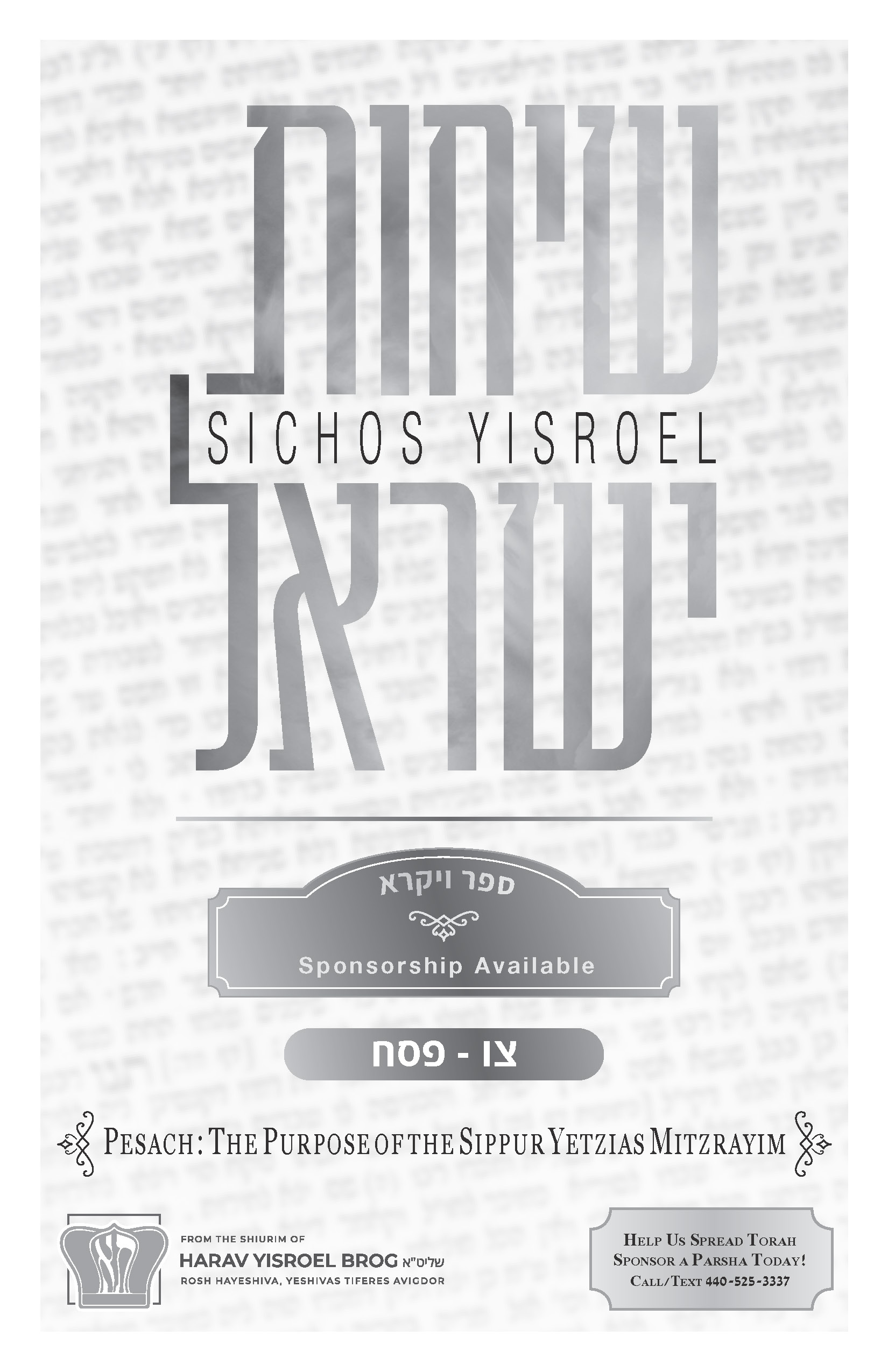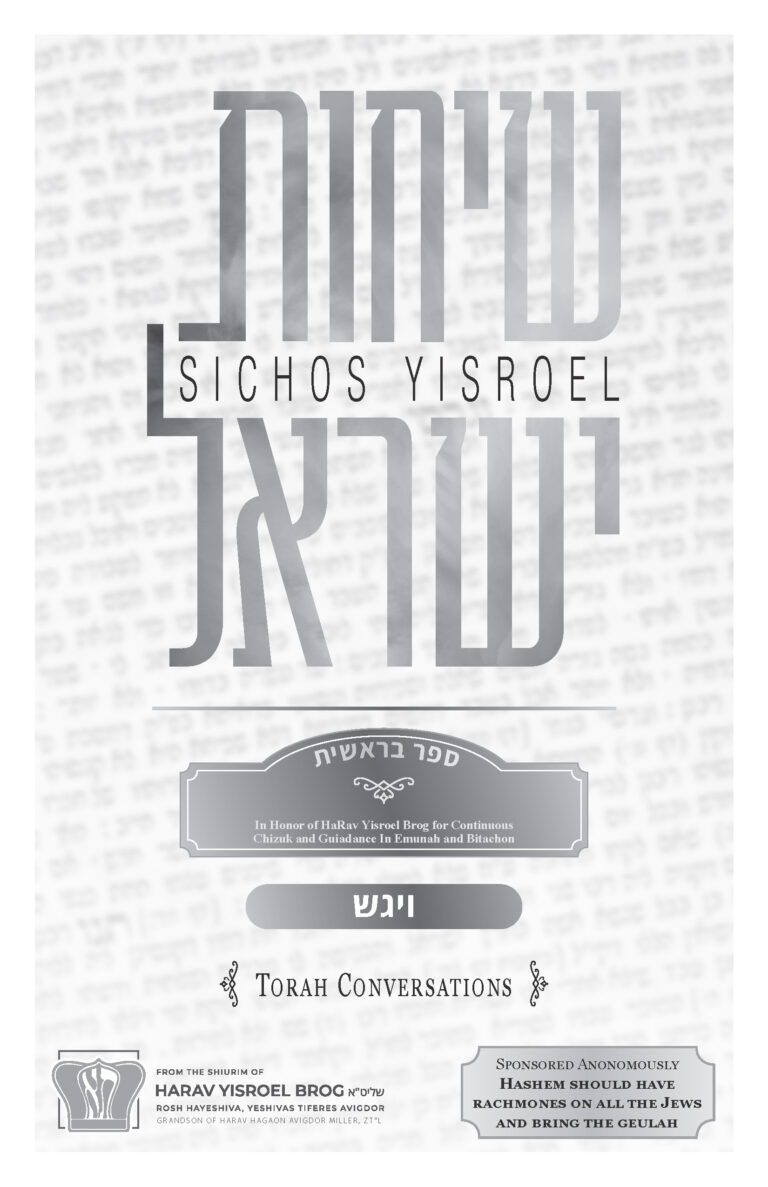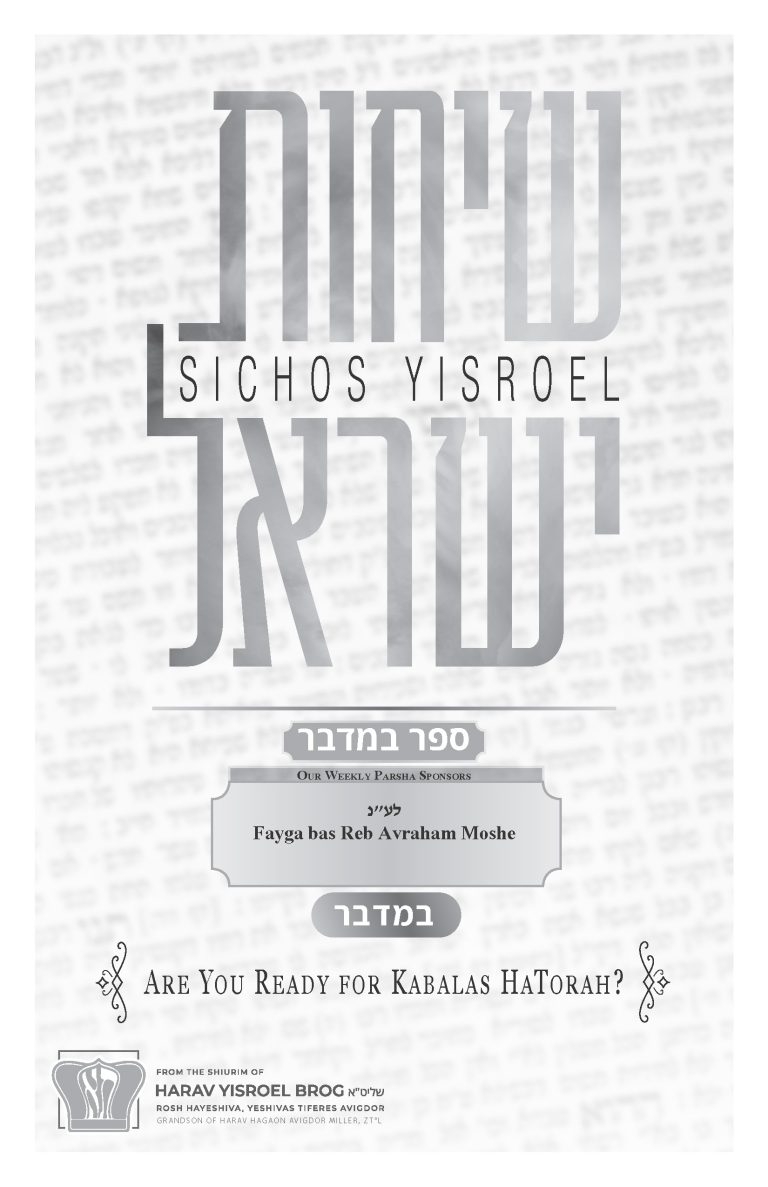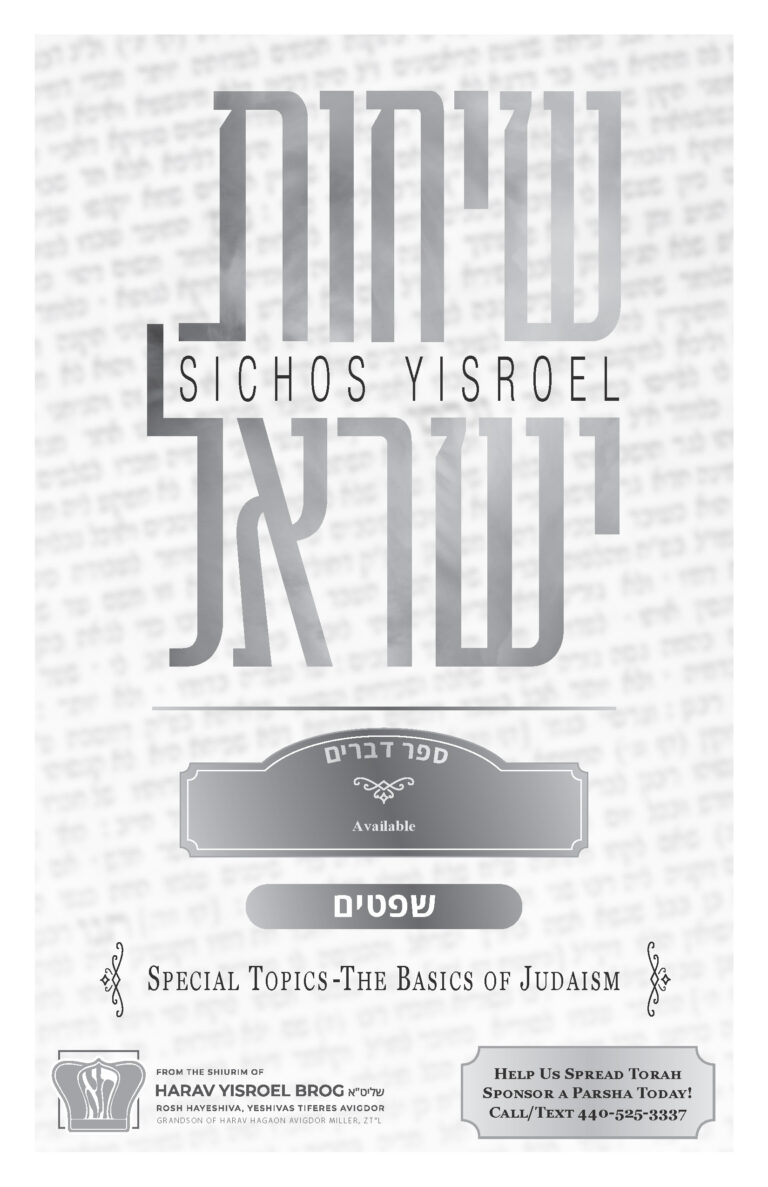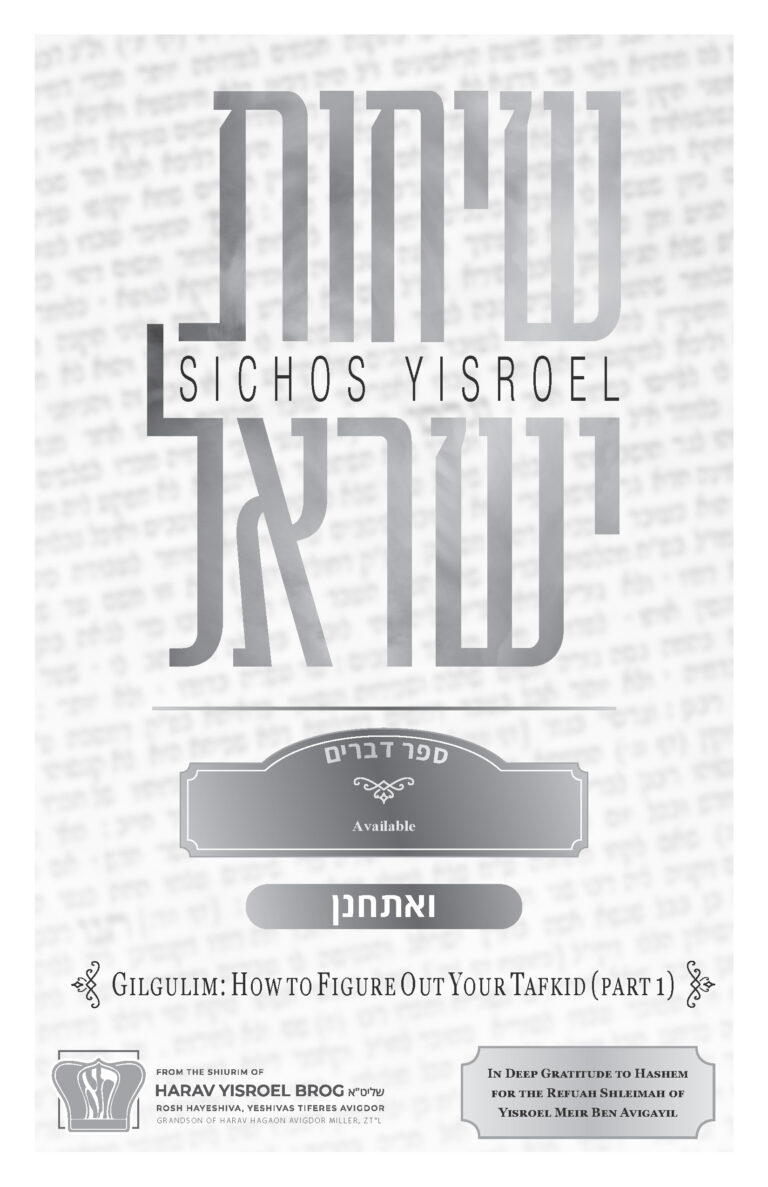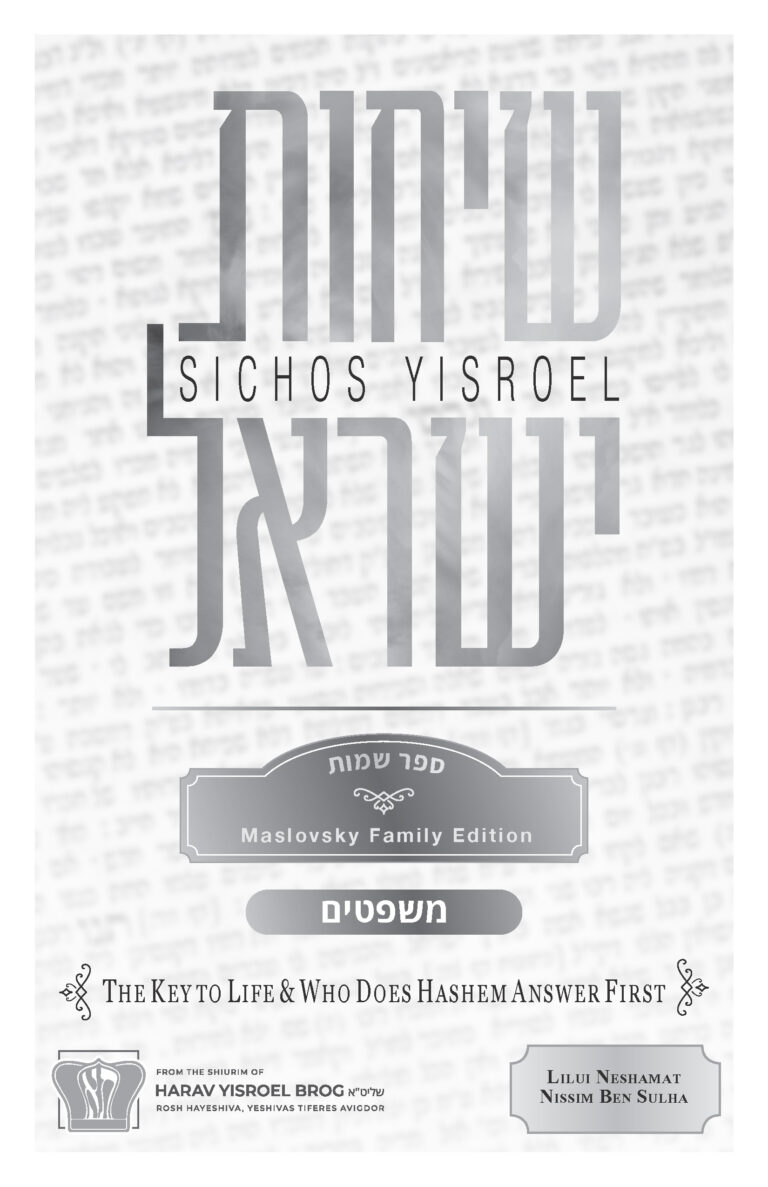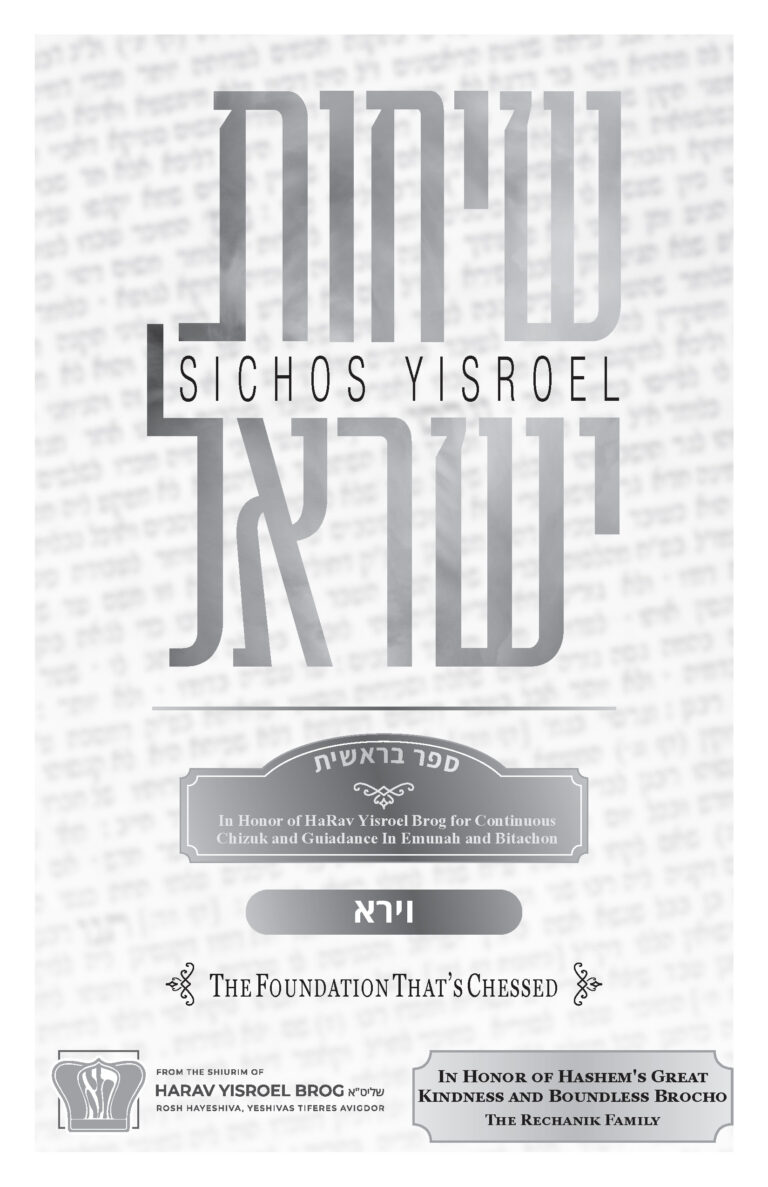Pesach 5783: The Purpose of the Sippur Yetzias Mitzrayim
Sponsored
לעילוי יצחק מאיר בן לב בלוי
Consider sponsoring a shiur
Visit YTATorah.org
Shiur presented in 5782
The Exercise in Gratitude
The big mitzvah on Pesach is the Mitzvah of the Sippur Yetzias Mitzrayim. We must know and understand what is the purpose of this night. Why do we make such a big fuss about repeating the same story of Yetzias Mitzrayim every single year? So if you are still not sure, listen carefully, because you’ve been doing it for so many years already and it’s a good idea to know why you are doing it. So what’s behind this Mitzvah? Why does Hashem want me to perform the Mitzvah of relating the story of Yetzias Mitzrayim? It’s definitely not to pass the time. You know that, right? I actually knew of a fellow who didn’t like the Haggadah. He would start his Seder, make the kiddush, dip the karpas, open up the Haggadah and then he would say, “This holiday is called Passover. Let us now pass over the whole Haggadah and go straight to the meal!” That’s what he did. Nebach!
So what does Hashem want from us with this mitzvah? What’s the purpose of the Sippur? Now, in light of yesterday’s shiur, you might have thought that the main purpose behind this mitzvah is to mechazek our emunah; however, that’s not what the mitzvah of the sippur of Yetzias Mitzrayim on this night is all about. The mitzvah is, in the words of the Sefer HaChinuch (Mitzvah 21): ולהלל ולשבח לשם יתברך על כל הנסים שעשה לנו שם – “to thank and praise Hashem for all the miracles that He did for us there.”[i] The Rambam in the Sefer Ha’Mitzvos (Positive Commandment 157) describes what happened to us in Mitzrayim, how Hashem exacted vengeance from the Mitzrim, and how we must thank Hashem and have gratitude to Him for all of His chasadim.[ii] So the purpose of Sippur Yetzias Mitzrayim is an exercise in the mitzvah of hoda’ah to Hashem. On this night, we were born and our galus basically ended, and therefore Hashem wants us to perform the mitzvah of giving hoda’ah to Him.
Does Hashem Really Need My Gratitude?
The Ramban repeats this idea, namely that the essence of this evening’s mitzvos is to express our gratitude and thanksgiving to Hakodosh Boruch Hu.[iii] So if you are sitting at your Seder and you are getting frustrated because, maybe they are going too fast or they are going too slow, or maybe your gartel is not in place, or maybe the weather is not so good, or you are hungry – the bottom line you are suppose to think is, “I am here to express my gratitude to Hashem.” The purpose of Seder Pesach is expressing gratitude to Hashem. Now, it’s very difficult to do that. I told someone today, “All that Hashem wants from you is to express gratitude.” You know what the person responded back to me? “Oh, come on, I can’t take that! I can’t handle that.” I asked him, “Why not?” He said, “Hashem doesn’t want anything from me. He doesn’t need anything from me. There’s nothing in the world that I can possibly give Hashem! Enough is enough with all this thanks and all this gratitude!” I told him, “It’s not for Hashem’s sake. Yes, Hashem doesn’t need your gratitude – you are a creation of Hashem. Hashem wants you to have gratitude so that you can grow closer to Hashem, so that you understand why you are serving Hashem and you grasp why a Jew has to perform mitzvos not like a goy.”
Count Your Blessings
Every Jew, at some point, has this challenge, that a goy is chofshi min ha’mitzvos – “he’s free from mitzvos.” He seems to have more freedom. And, on top of that, we want to know why we are obligated in so many mitzvos. And the answer is because we owe Hashem gratitude. There is a wonderful Chovos HaLevavos who says an interesting statement. In the pesicha to Sha’ar Avodas Elokim, he says, “Consider and think how many tovos and chesed Hashem does with you.”[iv] In the last day alone, I thought about the people that I interacted with who suffered awful things. A young 35 years old, a noted talmid chacham, a big lomed Torah, an author of the beautiful sefarim, a beautiful person who sat and learned and helped his family, was there for his wife – recently passed away. Thirty-five years old! Now, you know what happened to that family in one minute? Their lives changed forever. That wife will never get back her husband. Those children will never get back their father. And he was a great husband and a father. Their lives will never be the same again. I didn’t have that experience. Why? Was I better than him? No. The reason is because I was zoiche and you (my talmidim) were zoiche to the chasdei Hashem.
I also heard about a person who had terrible back pains. Actually two people. They don’t come by invitation. They come when Hashem sends his shluchim. I didn’t have that in the last two days, or in the last few weeks. A few weeks ago, I heard about someone who had terrible back aches, and I forgot to thank Hashem. The next day I woke up or I was walking around, and suddenly, “Ahhh.” My back went out. I said, “I’m so sorry Hashem. I’m really sorry Hashem. Forgive me. You are so kind for letting me know what I have to thank You for, and I didn’t. I regret that I didn’t thank You for that.” Do you know what that is? I’m very thankful to Hashem that I’m not sick. A lot of people are walking around sick these days: Whether it’s corona or a bad cold or a cough – Boruch Hashem, I feel good. You owe Hashem for that!
Wiggling Your Toes
I know a person whose toes did not work at one point. He woke up one morning and the next thing he knew, his big toe wasn’t working. He went to a doctor. The doctor tells him, “We have to cut your big toe off.” Oh, did I thank Hashem that day for my toes! I was moving my toes the whole day in my shoes and thinking, “Hashem there is no difference between me and that fellow!” And then they cut another one of his toes off. And then they had to cut a part of his foot off. I’m thinking every time, “Hashem, wow…” I remember a man who lost one foot first and then he lost another foot! I can’t imagine it! Do you know what kind of chassadim that Hashem does for us?! And Hashem doesn’t do them because He needs me to thank Him, or because He needs accolades. Hashem wants me to feel that everything I have, I have only from Hashem and I feel elevated and I want to become closer to Hashem and I want to bond to Him for His tremendous favor and warmth that He showered me with! I could have been an Egyptian today! I could’ve been a lousy, stinking smelly, dusty, dirty Egyptian living in Egypt! And I got out! Actually, my “genes” got out. Don’t ask me how, but they made it out. Obviously I wanted to get out. So Chovos HaLevavos says that if a person thinks how much he owes Hashem, let’s say, for five of his toes. Would you tell Hashem that you are going to be a good boy and do His mitzvos, if He wouldn’t take away one of your toes? Yes, of course! Would you tell Hashem that if He wouldn’t take a part of your foot, you will be a tzaddik? Yes, of course!
What Obligates You to be Frum?
I recently heard of people who had all kinds of eye problems. Do you know What kind of thanks and gratitude you need to express to Hashem for your eyes? People had car accidents. People were smashed in car accidents. I just heard of a terrorist attack in Eretz Yisroel yesterday (March 27, 2022), a major terror attack! Last week, on Tuesday, (March 22, 2022), there was another major terror attack in Be’er Sheva! I was reading about four people who were killed in that attack in Be’er Sheva. Regular people. They all thought that they would be home that night. One was a Chabad shliach. He for sure was already preparing for Pesach. I am sure he had a little break after Purim, which is a very busy time for the Yidden in Eretz Yisroel. But he never made it home that night. I made it home from Purim. I owe Hashem for that! So you have to feel obligated to Hashem. There are no freebies, Rabbosai. You don’t get anything for free! You don’t give anything out for free and you don’t get anything for free. You have to give Hashem your tremendous and continuous shevach – “Hasmodas tehillah.” That’s why, Chovos HeLevavos says, you have to be frum![v] I was just in Flatbush. At the same time when I was in Flatbush there were other people in Flatbush who were getting attacked by gangsters! I was walking in Flatbush like I was walking in my backyard. Hakodosh Boruch Hu helps us, and that’s what obligates us to do Mitzvos. So when you think, “Why should I do mitzvos?” Why should I serve Hashem?
A Birthday that Obligates Us
Here is your answer: Leil Pesach is when we became Jewish. It’s the night in which we were initiated into avodas Hashem – that’s what this night is all about! And all the mitzvos, like the Ramban says (Shemos 13:16), וכוונת כל המצות שנאמין באלוקינו ונודה אליו שהוא בראנו – “the purpose of all the mizvos is so that we believe in Hashem, our G-d, and acknowledge and He created us.”[vi] The purpose of all the mitzvos in the Torah is that we should acknowledge that whatever we have, is we have by His kindness. A person loses one tooth, you know what that is? I remember thinking about it when my rebbi (Rav Meir Halevi Soloveichik, zt”l) was losing his teeth, slowly but surely. It was very hard for him to eat matza. I am in the middle now of some dental work myself, and in the future it will be difficult for me to eat matzah, but this Pesach, I am thankful that I still have enough teeth to eat the matzah with! You have to thank Hashem for everything!
Little disturbances like these cause such upheavals in your life. I know five people who broke their metatarsals in the last three-four weeks, just walking in the street. There is a young kallah, a chashuve kallah who was walking home from a Shabbos seudah, when she lost her footing and fell, breaking her foot. That’s what it is. A little slip, a little turn. It’s the easiest thing. I’ve walked in all kinds of places. I walked fast when it was snowing; in the last few weeks there was some slush and snow here in Cleveland and Boruch Hashem I didn’t fall, and I am grateful for that. A person has to know this. You should know that the Chovos HaLevavos writes, וכל אשר יוסיף הבורא טובה לאדם – whenever Hashem increases His beneficence to an individual, חייב עליה עבודה – that obligate him to serve Hashem better (Sha’ar Avodas HaElokim 6:1-9).[vii]
Nachas, Health, Marriage – Thank Hashem
My first granddaughter recently got engaged. It was easy, just like I wanted it to be, and calm, like I expected Hashem to deliver it. When she turned 18, the first boy that she dated she got engaged to. I’m looking forward to meeting the chosson. I hear wonderful things about him. I’m looking forward to expanding and adding to my social life. No, not every grandchild is the same. Do you know people have grandkids, and some are just duds. The only thing they are good at is breathing, which they do well for 24 hours, seven days a week. And when the zeide asks them, “Nu, wie geht’s – how is it going?” He says, “Oooh” – he looks like he belongs to some mental institution at that moment. And when the zeida says, “Are you learning?” the kid answers, “Ahhhh…” He can’t respond, he doesn’t know what world he is in. You should know it’s not uncommon. I’m telling you if you speak to a lot of kids, that that’s what you hear, it’s a nebach on the grandparents. “What can I buy you, scheifele?” “Ahhh…” Or when a zeide asks, “Did you learn well this zman?” “Ahhh…” Could you tell me over something? And he just smiles at you. Then you ask him, “Nu, what did you learn this zman?” He says, “Zeida, I learned Gemara.” That’s nice, which one? He says, “I can’t remember. The yeshiva is over already, zeida, I am not thinking about it right now. I have other things on my mind.“ You know what kind of nachas that is? It’s nachas like collecting garbage. So if you have an eineklach with whom you could talk in learning – someone who could tell you a vort and someone who also could hear a vort – wow! You know what this is? That’s nachas!
Everyone Needs a Good Friend
As I continue thinking about how grateful I am to Hashem, I think about the many people who have died whom I have known all my life. A lot, too many! I remember when my rebbi lost a very good friend of his who passed away. His name was R’ Yitzhak Chaim Krasnitsky. He was a moiradike talmid chacham, an alter Mirer, and a talmid of Brisker Rav. After R’ Yitzhak died, my rebbi told me, “Yisroel, zolst du vizen – it’s becoming very, very lonely in the world. I don’t have whom to talk to anymore.” I said, “Rebbi, I wish I could replace the people whom you could talk to, but I know that I am not coming from where you are coming from and I am not worthy of this. But I could try to do the best.” I knew it wouldn’t be enough. I was trying to work on being a shomea of my rebbi – to hear what he had to say. But to fill in and serve in place of that old friendship? It’s impossible. So it’s incredibly important for a person to have someone to talk to.
What if a person loses a wife, r”l? I know a very big talmid chacham, a world’s talmid chacham who lost a wife. She was a good wife, a great eizer. Do you know what that is? “It’s very shver,” he told me. And he’s a very capable person. He knows how to make eggs by himself, he knows what street he lives on, he’s a very capable person. He knows how to cook water without a problem. So if you have a wife, you better thank Hashem for that!
What’s Behind the Four Cups?
When you drink the daled kosos, what are the daled kosos all about?
The Gemara (Berochos 54b) says: אמר רב יהודה אמר רב ארבעה צריכין להודות – “four people are obligated to express gratitude.”[viii] Do you know who these people are? People who safely crossed the sea, people who were sick and got healed, people who were imprisoned and got released, and people who safely crossed the desert. So both the Gr”a and the Maharsha say that daled kosos are predicated on the din of ארבעה צריכין להודות – because when Klal Yisroel left Mitzrayim, they went through the sea and the desert, they were healed from their sicknesses and they were released from the prison of Mitzrayim. And that’s why we take the four cups on this night, and thank Hashem on each one! מה אשיב לה’ כל תגמולוהי עלי – “how can I repay Hashem for all His bounties to me,” asks Dovid (Tehillim 116:12). And therefore, כוס ישועות אשא – “I raise the cup of salvation.”
The Radak (R’ Dovid Kimchi, 1160-1235) comments on the above pasuk in Tehillim, that when I will make mishte v’simcha, I will lift my cup of wine and I will say a hoda’ah to Hashem bifnei rabim, and I will remember Hashem’s yeshuos, she’hoshieni (“that You saved me.”) And this is called “kos yeshuos.”[ix] You don’t find this in other Rishonim. But if you look in the Sefer Ha’Michtam (R’ Dovid ben Levi of Narbonne, 13th century), from one of the Rishonim, he says, in the beginning of the perek of Arvei Pesachim, that the arbah kosos are really “arbah inyanim gedolim shel geulah” and with each of them you have to be “marbeh shevach v’hoda’ah l’makom.”[x]
So when you come to the first cup of kiddush and you are sitting and thinking to yourself, “What am I being mekadesh over here? What am I thanking Hashem for?” I am thanking Him for taking me out of Mitzrayim and making me a Yehudi! Today is my birthday! When you drink that first cup, you should think, “Hashem, I want to thank you for making me a Yid!” And when you come to the second cup, you say, “Hashem, thank you for taking us and our forefathers out of Mitzrayim – asher ge’alanu vega’al es avoseinu.” All of the cups are different steps of the same avodah of thanking Hashem. The whole seder avodah of leil Pesach is about introducing yourself to the subject of Avodas Hashem through hoda’ah, through gratitude.
With the Pinpoint Accuracy
Do you know how much gratitude you need to have to Hashem for not having suffered from Corona, if you happen to be in that category? Do you know how many families are never going to be the same because of coronavirus? Do you know how thankful I am to Hashem that my family did not experience Corona? You have to know that you have to thank Hashem for that! That’s mechaev you! It’s not something that just happened. Hakores hatov is the whole chiyuv of this night! It’s very difficult to work on hakaras hatov because when you mumble the words, “Thank you, Hashem, for taking us out of Mitzrayim” – do you know what that means? Zero. You are not thankful, you are not anything. Unless you can pinpoint the exact things or situations where you appreciate what Hashem did for you, or took you out from, or saved you from – your gratitude has very little value when you claim that you are “thankful to Hashem.” That’s what it’s all about, that’s what Pesach is all about.
When you are talking to your children, you’ll have to tell them about this. The complaints – that, they know. All the children are experts in complaints: they know what they are complaining about, they know what they’re missing – that they are experts in. They know what they don’t have. But to thank Hashem and to act like a Jew, and to show your appreciation of Hashem – like He wants you to do – that takes a lot of work. So וכל המרבה לספר ביציאת מצרים הרי זה משבח – you have to think about as many details as you can when it comes to this subject.
Seeing Hashem’s Chesed in Darkness
My zeide’s (Rav Avidgor Miller, zt”l) entire life was one continuous hoda’ah to Hashem. That’s what he was all about. There are people who find themselves in difficult situations. Listen now to these amazing words of the Mesilas Yesharim (8:6): והנה אין לך אדם באיזה מצב שימצא – “there is no person, no matter what situation he may find himself in,” אם עני ואם עשיר, אם בריא ואם חולה, שלא יראה נפלאות וטובות רבות במצבו – “whether he’s a poor, rich, healthy or sick, who doesn’t see wonders and many great benefits of his particular station in life!”[xi]
I know people with wives who are not well emotionally. But do you know how much good is in those wives?! You know how much tova there is in those wives?! It’s amazing! But the problem is that a person always focuses on the negative. The Mesilas Yesharim says that there’s no possible matzav in your life where you don’t see miracles and goodness of Hashem! He says a healthy man and a wealthy man have to thank Hashem big time for their wealth and their health. And even the poor person is chaiv to thank Hashem even in his poverty. Do you know why? Because he’s not starving to death, he has what to eat. Somehow Hashem provides them with enough kedushim and enough brissim. A sick person also has to see many miracles and goodness around him because Hashem supports him and doesn’t abandon him.
Let’s say a poor guy lives in Lakewood. You are not going to see a thin ani in Lakewood! The aniyim in Lakewood are going to be larger than most other people, because other people are running to work and these aniyim are running from bris to bris. They know where the milchig brissim are, they know where all the fleishig brissim are. They first run to the milchig one and then they go to the fleishig. They get hitches all around. Today, a sick person in any large hospital in Lakewood or New York has amazing bikur cholim services available to them. If you go to a hospital in Cleveland, for example, they will treat you and feed you like royalty! You know what kind of chessed it is? That’s Hashem Who’s orchestrating all of that! It’s not that the people of Cleveland or in New York are not the nicest people. They are! It’s Hashem Who’s providing for the Yiddin – that’s what it is. Mesilas Yesharim says that there’s no person in the world who is not obligated to Hashem a hoda’ah. “And when a person looks into the tovos that he has received from Hashem, for sure, he will definitely wake up and will be motivated to do Avodas Hashem,” he informs us.
He says, “Don’t be lazy from doing a proper avoidah.” Recognize this, and you will be the happiest person in the world, and you are going to save yourself so much trouble and tzoros and challenges. So prepare yourself for the long Seder this year. And by the long Seder you should not be thinking: “When am I getting my food?” or “When am I going to get a matzah ball in my chicken soup?” – if you are Litvak. And if you are Chassid, I am sure you are looking forward to a good shmaltz with your matzah. Today in the world you don’t see schmaltz. I was once in Monroe on Erev Pesach and I went into a local store, where I saw rows and rows of one liter milk bottles piled sky high in their window. They had in them this whitish or grayish color liquid. It didn’t look like a milk store to me, so I asked a guy there, “What are you selling here?” He said, “Ah, this is a goote shmaltz.” They use it as butter and oil; they use it for everything! Nu? Hashem provides anything for everybody! So think during Pesach Seder, “I acknowledge that I owe you, Hashem. I am happy that I am a Yid.” אשרינו מה טוב חלקנו ומה נעים גורלנו ומה יפה ירושתנו – I am thankful that I’m a part of this Uma Ha’Kedosha, this Chosen Nation, and I hope that I can become elevated in my gratitude to Hashem – since this is what Hashem wants from me – to feel gratitude, to show gratitude and to act with gratitude!
The Bottom Line
The mitzvah ofSippur Yetzias Mitzrayim is an exercise in hoda’ah to Hakodosh Boruch Hu for all His chassadim – not only for redeeming our forefathers from Mitzrayim – but also for showering us with His constant kindnesses as well. The expression of this hoda’ah, however, is not for Hashem’s sake – He doesn’t need our gratitude because, after all, we are His creations. Rather, as the Ramban writes, the purpose of all mitzvos is to believe in Hashem, and to “acknowledge [i.e be grateful] to Him for having created us.” This means that by verbally enumerating Hashem’s daily chassadim, we’ll grow closer to Hashem, to better understand why we serve Him, and to grasp how the nature of our service is fundamentally different from that of the rest of the nations. In the few remaining days before the Seder, I will compile a short list of some of the most basic chassadim of Hashem that I am grateful for, like, being alive and in good health, not having terrible back pains, being able to wiggle my toes, being able to see, smell and hear, having healthy parents, spouse, children, and siblings, and also good, faithful and encouraging friends and rabbeim. And when I raise my four cups of wine during the Seder, I will also think aboutthe times that Hashem helped me overcome life’s challenges of crossing difficult “deserts” and raging “seas” and having been saved from my own “prisons” of yetzer horas of addictions or other health issues, throughout the year. And in the zechus of focusing on this goal, im yirtzeh Hashem, I will have the best, most elevated Pesach of my life and be zoiche to grow closer to Hashem and realize the real reason why I am serving Him!
[i] מצות ספור יציאת מצרים – לספר בענין יציאת מצרים בליל ט”ו בניסן, כל אחד כפי צחות לשונו, ולהלל ולשבח לשם יתברך על כל הנסים שעשה לנו שם. שנאמר (שמות יג ח) והגדת לבנך. וכבר פרשו חכמים, (מכילתא בא שם) דמצות הגדה זו הוא בליל ט”ו בניסן בשעת אכילת מצה. ומה שאמר הכתוב לבנך, לאו דוקא בנו, (פסחים קטז, א) אלא אפילו עם כל בריה.
[ii] היא שצונו לספר ביציאת מצרים בליל חמשה עשר מניסן בתחלת הלילה כפי צחות לשון המספר. וכל מי שיוסיף במאמר ויאריך הדברים בהגדלת מה שעשה לנו השם ומה שעשו לנו המצרים מעול וחמס ואיך לקח השם נקמתנו מהם ולהודות לו יתעלה על כל טוב שגמלנו יהיה יותר טוב כמו שאמרו וכל המאריך לספר ביציאת מצרים הרי זה משובח, וכו’
[iii] ע”ע השגות הרמב”ן על ספר המצוות, שכחת העשין ט״ו
[iv] וראוי להקדים בפתיחת השער הזה ביאור אופני הטובות וחיובי ההודאה עליהם מבני אדם קצתם לקצתם. ונעלה מזה אל מה שאנו חייבין בו לבורא יתעלה מן השבח וההודאה על רוב חסדו וגודל טובו עלינו, וכו’. (שער שלישי – שער עבודת האלוהים, הקדמה)
[v] וכאשר נעמוד במחשבותינו על גדולת הבורא יתעלה ועוצם יכלתו וחכמתו ועשרו ונסתכל בחלישות האדם וחסרונו ושאינו מגיע אל השלמות ורוב צרכו ורישו לדבר שימלא מחסורו ונבחון רוב טובות הבורא יתברך וחסדו עליו ושבראהו כמו שבראהו מן החסרון בעצמו והוא רש וצריך אל מה שיש בו תקנתו ולא יגיע אליו כי אם ביגיעת נפשו וזה מחמלת הבורא עליו כדי שיכיר את עצמו ויבחן בכל עניניו וידבק בעבודת הקל עכ״פ ויקבל על זה גמול העוה״ב אשר לו נברא כמו שהקדמנו מן הדברים בשער השני מן הספר הזה כמה האדם חייב לו ית׳ מן העבודה והיראה והשבח וההודאה והתמדת התהלה עם ברור חיוב כל אשר הקדמנו מן שבח ב״א והודאתם קצתם לקצתם. ואם יש איש סכל שחולק בחיוב כל זה לבורא יתברך על האדם כשהוא מבחין ומתבונן בענין הזה ומודה באמת על עצמו הלא יעור הישן ויקץ המתעלם ויבחין הכסיל וישכיל המשכיל ברור חיוב קבלת עבודת האלהים עם ברור הראיות ופרסום העדים ואמתת המופתים וכמ״ש הנביא ע״ה למי שהתעלם מעיין בקבלת עבודת האלהים ית׳ (דברים לב) הלה׳ תגמלו זאת עם נבל ולא חכם. א״כ כבר נתברר חיוב קבלת עבודת האלהים על בני אדם מצד התמדת טובותיו עליו, וכו’. (שם)
[vi] וכוונת כל המצות שנאמין באלוקינו ונודה אליו שהוא בראנו, והיא כוונת היצירה, שאין לנו טעם אחר ביצירה הראשונה, ואין אל עליון חפץ בתחתונים מלבד שידע האדם ויודה לאלהיו שבראו, וכוונת רוממות הקול בתפלות וכוונת בתי הכנסיות וזכות תפלת הרבים, זהו שיהיה לבני אדם מקום יתקבצו ויודו לאל שבראם והמציאם ויפרסמו זה ויאמרו לפניו בריותיך אנחנו, וזו כוונתם במה שאמרו ז”ל (ירושלמי תענית פ”ב ה”א) ויקראו אל אלהים בחזקה (יונה ג ח), מכאן אתה למד שתפלה צריכה קול, חציפא נצח לבישה (רמב”ן על שמות י״ג:ט״ז)
[vii] אמר השכל כי תוספת העבודה על אנשיה מתחלקת מדרך הכלל והפרט בטובה עליהם. והטובה על המדברים על ארבעה ענינים. הראשון טובת הבורא הכוללת כל האדם והוא המציאם אחר שלא הי׳ דבר נמצא והחיותם והטובה להם בכל אשר הקדמנו זכרו בשער השני מן הספר הזה וע״כ הם חייבים לבורא יתברך עבודה כוללת, וכו’. והענין השני טובות הבורא על עם מן העמים ואומה מן האומות כמו שהטיב לבני ישראל בהוציאם מארץ מצרים והביאם אל ארץ כנען וחייבם בזה עבודה יתירה על העבודה הראשונה והיא התורות השמעיות אחר שהזהיר והעיר על התורות השכליות. ומי שקבלה לכבוד האלקים יחדהו האל בטובה וחייבו עליה עבודה זולתי עבודת אומתו ושאר שבטו כמו שמצאנו שבט לוי, וכו’. והענין הג׳ טובות האלהים על משפחה ממשפחות האומה ככהונה ולויה וזרע המלוכה בבית דוד וחייבם על זה עבודה יתרה, וכו’. והענין הרביעי טובת האלקים על איש מאישי בני אדם נתיחד בה משאר משפחתו ועמו ושאר המדברים כנביא מובחר או נגיד (ס״א נביא) מצווה להנהיג אומה או חכם העיר אלהים את רוחו בחכמה ותבונה ועצה ודומה לזה ועל כל טובה מהם יתחייב בעבודה יתרה לאלקים, וכו’. ועל אלה ארבעה הענינים חייבים בני האדם בעבודת האלהים וכל אשר יוסיף הבורא טובה לאדם חייב עליה עבודה. ומן הראיה על זה כי התבואות חייבות במעשר שנאמר (דברים יד) עשר תעשר את כל תבואת זרעך ומי שנתן לו האלהים מאה כור של תבואה חייב ממנה עשרה כורים לאלהים ומי שנתן לו האלהים עשרה כורים חייב לאלהים מהם כור אחד, וכו’. (שער שלישי – שער עבודת האלוהים ו׳)
[viii] אמר רב יהודה אמר רב: ארבעה צריכין להודות: יורדי הים, הולכי מדברות, ומי שהיה חולה ונתרפא, ומי שהיה חבוש בבית האסורים ויצא.
[ix] כוס. יש מפרשים כוס חלק כמו “מנת חלקי וכוסי” [תהילים ט״ז:ה], ויתכן לפרש כמשמעו כלומר כשאעשה משתה ושמחה ארים כוס היין ואודנו עליו בפני רבים ואזכור ישועתו שהושיעני, ואותו הכוס יקרא כוס ישועות.
[x] ע”ע בספר כלבו [סימן נ] וז”ל: ולא יפחתו לו (לעני) מחלקי הצדקה מארבע כוסות של יין כנגד ארבע לשונות של גאולה, והוצאתי והצלתי וגאלתי ולקחתי, הכתוב בפרשת וארא על גאולת מצרים. וביאור הדבר כך הוא, שיש כאן ארבעה עניינים גדולים של גאולה שעל כל אחד לעצמו יש להרבות שבח והודאה אל השם יתברך.
[xi] והנה אין לך אדם באיזה מצב שימצא, אם עני ואם עשיר, אם בריא ואם חולה, שלא יראה נפלאות וטובות רבות במצבו. כי העשיר והבריא כבר הוא חייב לו יתברך על עושרו ועל בריאותו. העני חייב לו שאפילו בעוניו ממציא לו פרנסתו דרך נס ופלא ואינו מניחו למות ברעב. החולה על שמחזיקו בכובד חוליו ומכותיו ואינו מניחו לרדת שחת, וכן כל כיוצא בזה, עד שאין לך אדם שלא יכיר עצמו חייב לבוראו. ובהסתכלו בטובות אלה שהוא מקבל ממנו, ודאי שיתעורר להזדרז לעבודתו, כמו שכתבתי למעלה כל שכן אם יתבונן היות כל טובו תלוי בידו יתברך, ומה שמצטרך לו ומה שמוכרח אליו, ממנו יתברך הוא, ולא מאחר אשר על כן ודאי שלא יתעצל מעבוד עבודתו יתברך ולא יחסר לו מה שהוא מוכרח אליו.
